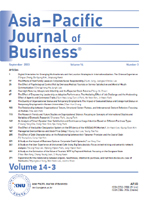중국 MZ세대 친환경 인식과 지각된 가치, 태도 및 친환경관광 행동의도 간의 구조적 관계: VAB 모델을 기반으로
A Study on the Structural Relationship between Environmentally Friendly Awareness and Perceived Values, Attitudes, and Pro-environmental Tourism Behavior Intention among China's MZ Generation Tourists: Focusing on the Value-Attitude-Behavior Model
- 강원대학교 경영경제연구소
- 아태비즈니스연구
- 제16권 제1호
-
2025.03419 - 435 (17 pages)
-
DOI : 10.32599/apjb.16.1.202503.419
- 11

Purpose - This study aims to analyze the relationships among pro-environmental awareness, perceived value, attitude, and behavioral intentions of China MZ generation tourists, focusing on the Value-Attitude-Behavior (VAB) model. By doing so, the study seeks to provide novel insights into existing pro-environmental literature and offer practical implications for sustainable management strategies in the tourism industry. Design/methodology/approach - A survey was conducted targeting China MZ generation tourists, yielding a final sample of 314 valid responses. Statistical analyses such as frequency analysis, factor analysis, reliability testing, correlation analysis, and regression analysis were performed using SPSS 26.0 to achieve the research objectives. Findings - First, the study confirmed that understanding and concern for environmental issues are key factors in enhancing tourists' perceived value. Second, it was found that the higher the perceived value, the more positive the tourists' attitudes toward participating in future pro-environmental tourism activities. Third, the study demonstrated that as the level of pro-environmental awareness increases among MZ generation tourists, they tend to perceive greater value, develop more positive attitudes, and show stronger behavioral intentions to engage in future pro-environmental activities. Research implications or Originalit - This study contributes academically by applying the VAB model to analyze pro-environmental awareness from the perspective of MZ generation tourists who have experienced eco-friendly tourism, offering a distinct approach compared to existing research. Practically, the findings provide a foundation for the tourism industry to formulate feasible management strategies focused on sustainability, proposing policy recommendations and practical solutions that can be implemented in the field.
Ⅰ. 서론
Ⅱ. 이론적 배경
Ⅲ. 연구설계
Ⅳ. 분석결과
Ⅴ. 결론 및 시사점
References
(0)
(0)